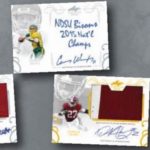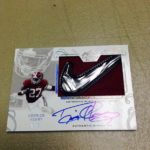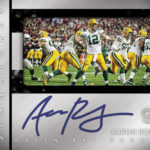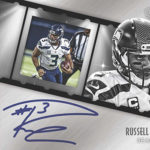Im sure some of you read the title of this post and not really understood what I am talking about. Because of this unfortunate fact , I think its worth bringing up some additional thoughts on event used material again, especially with the rookie premiere coming up in a few weeks. Im not totally against using them as a rule, but in a lot of ways, the advent of the practice has changed the hobby DRASTICALLY over the last decade and a half.
Background
Have you ever wondered why relic cards exist of the NFL rookie class before they get on the field ? I think that should be a clue. For reference, it can take months to create a card from scratch, which means that any card you see in packs started being produced well before it was packed out for you to rip. They have to print the cards, obtain the relics, insert the relics, build the card, and then, in many cases have them signed.
? I think that should be a clue. For reference, it can take months to create a card from scratch, which means that any card you see in packs started being produced well before it was packed out for you to rip. They have to print the cards, obtain the relics, insert the relics, build the card, and then, in many cases have them signed.
The way that ALL card companies have handled this situation, is to have players “wear” jerseys at the NFL rookie premiere each May in Los Angeles, sometimes in upwards of 50 at a time. These “event used” jerseys, which are also now called “player worn,” are then cut up and inserted into trading cards through the whole year.
You might expect that the “player worn” relics are the ones pictured in the photographs taken at the rookie premiere for use, but that is also a common misconception. The jerseys in all trading card pictures are provided by the league and players association, and are not used in trading card production.
In reality, the companies set up stations and players are handed one jersey at a time to slip their arms into, and take off immediately. The jerseys dont even have to be the same person trying them on. Some jerseys just have number 88 with “Player” as the nameplate. I have heard Panini using blank jerseys with no patch material to increase yield of relics they can get. Its an assembly line of relics that I would say are even a stretch to be called relics, let alone player worn. That is the reason the issue exist.
Even worse, players who have game used material available are now being sent through the same process in some cases , as relic content is so expensive to obtain, but thanks to this process are now diminished significantly in value.
, as relic content is so expensive to obtain, but thanks to this process are now diminished significantly in value.
Back in 1995 and 1996, relic cards were the new hot thing, and some sold for hundreds of dollars. Now that every product released has relic content, and every rookie has insane patches in just about every card, the base relic game has slowed considerably.
Impact of Event Used / Player Worn Material
Bottom line, what is done at the NFL and NBA rookie premiere impacts all sports. Because relic content obtained through player worn means is exponentially cheaper and easier to get, companies can offer better quality patches in their cards . Seeing a one color patch in any premium product is so rare these days, that collectors have devalued lower “quality” patches to the point of worthlessness almost.
. Seeing a one color patch in any premium product is so rare these days, that collectors have devalued lower “quality” patches to the point of worthlessness almost.
Non-patch cards without signatures in football almost dont exist outside of Panini products these days , and that is not by accident. Some products have hype lines in the sell sheet that talk about the quality of every patch card. Its not because the content has changed, its that people’s perception has changed. Because cards that feature player worn relics are so readily available from the rookie premiere, no one wants the game used stuff unless it is of the same quality. The problem is, that is a much taller task than people expect.
, and that is not by accident. Some products have hype lines in the sell sheet that talk about the quality of every patch card. Its not because the content has changed, its that people’s perception has changed. Because cards that feature player worn relics are so readily available from the rookie premiere, no one wants the game used stuff unless it is of the same quality. The problem is, that is a much taller task than people expect.
I would guess that the card companies noticed quite quickly that logos and multi colored patch cards had a premium, and that usage of the valuable parts of the jerseys was more consciously approached during 2008, 2009, and 2010. Before that, it was less deliberate outside of the league logo patches, which in their own right didnt find official recognition in 1/1 cards until the mid-2000s .
.
To give you an example, Panini used so many logos per rookie player in products like Black Gold and other premium products that the cards no longer sell for a huge amount more than the other versions might sell . That would never have been the case in 2003 or even 2007.
. That would never have been the case in 2003 or even 2007.
You can find logos pretty cheap just about everywhere too:
2015 National Treasures Stephon Diggs Logo Auto /25
2015 Spectra Karlos Williams Logo Patch Auto /10
2015 National Treasures Melvin Gordon Booklet Logo Auto /2
The flood of top quality patches has driven down prices so much that wax as a whole has been hurt as well. Product shelf life is shorter than ever, as mentioned many times before, and this is a contributing factor. The ancillary relic hits in any box have so little value that Topps has almost stopped using them in premium products, instead opting for other types of “value added” inserts.
Panini even tested a product last year that didnt offer anything more than parallels and a relic for 8 out of 9 boxes within the case. Within months, it was at half of MSRP. Of course, that didnt stop them from bringing it back again for another run, but this time, more autograph content was added.
My argument is that the increasing number of crazy logo patches from player worn sets is the reason this has happened.
Education
Adding fuel to the fire is easy, especially when you see how few people understand what player worn relics really are. They are not game worn, they are not practice worn, and they are barely touched at all. Event used footballs have more contact with a player in most cases than the jerseys.
With a lack of education comes a valuation that might be mistakenly influenced. If there are people out there who still think these relics have any real connection to the player, they will assign value differently than those who might be educated as to their source.
Its worth speaking about the aesthetic of a logo patch card versus a plain relic card, and how some value the look of a patch against the plainer versions, but I just dont see that being as big of a deal. If Panini is going to have rookies put on 50 jerseys at the premiere, plus another 50 as the season progresses, are those logo patches that much more rare anymore? Not really.
I also want to worn people that the solution to the problem isnt as clear cut, because without the rookie premiere, there are no more rookie relics to be had. First off, not every rookie gets on the field, or even on the sidelines. If they do get on the field, many times there are a lot of interested parties who want the jersey, including the player. As the season moves on, card production timing just doesnt fit well with including game used swatches, and that means products are much less intriguing for many collectors.
As invaluable as relics have become, a lack of relics could be more disastrous to a calendar of products that is 30 strong. Eventually autographs just dont do it as much, and without player worn relics in play, that means more expense has to be dedicated to filling the checklist through other means.
Clearly, the number of people buying products is on the decline, so fewer and fewer risks can be taken without someone losing their job. Im curious how long it will be before relics arent even player worn, as it almost doesnt matter in the first place. If people just want a patch because it looks cool, just give them a patch, right? Things are not looking good in that respect.
Sure, some relics still have value, especially older players. We can all understand within reason how that well is not deep enough to be sustainable forever, and how much history could be damaged through the cutting up of these pieces.
Where do we go from here?
At some point the industry will reach a crossroads, as mentioned previously. At some point, a change will be forced. We have all been curious as to the next big thing, but it might never come in physical form. Over the last 20 years, relics have gone from real , rare and valuable to “kind of” real, common and worthless.
As the digital medium ramps up, this could change – especially as the apps use relics in the aesthetics of the designs for their cards.
That being said, im not holding my breath. The toothpaste is out of the tube, and its going to be hard to get it back in.















